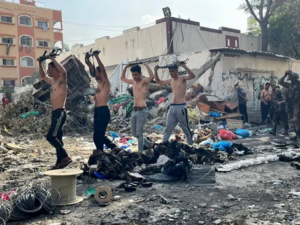IDF admits having thousands of confiscated items of Gazans detainees, refuses to provide info

Palestinian detainees in Beit Lahia, northern Gaza, in 2023
Hagar Shezaf reports in Haaretz on 15 April 2025:
The Israeli military admits being in possession of cash and thousands of objects belonging to residents of the Gaza Strip who have been arrested since the war began 18 months ago, but refuses to provide information about how much money it has confiscated, how many objects it holds or the nature of those objects, saying this information hasn’t been collected in any central database.
It also refused to divulge the orders governing property confiscated from arrested Gazans, saying they are classified. But that refusal violates the Freedom of Information Act, which requires any public agency to allow the public to see the orders under which it operates.
The Israel Defense Forces’ response, or lack thereof, was given to the Hatzlacha organization in response to a freedom of information request.
Since ground troops first entered Gaza in 2023, thousands of Gazans have been arrested and imprisoned in Israel. Initially they are held in military facilities; some are later transferred to Israel Prison Service facilities. Upon being arrested, any belongings they have on them are confiscated. But according to detainees who have been released and lawyers representing freed detainees, the army doesn’t return all the confiscated property to the detainees when it lets them go.
Hatzlacha filed its freedom of information request in September. The organization sought a list of all property confiscated from Gazans arrested since the war began that is still in the army’s possession, as well as details about how the property is stored and any orders relevant to this issue.
Last week, the IDF refused to respond to any of the requests for details about the items, saying this information hasn’t been collected into any central database, so answering the questions would require checking thousands of objects and monetary deposits manually. As for the orders, it said these were classified, but in any case, “no orders were found” regarding how the property should be stored.
But according to Hatzlacha’s legal adviser, Elad Man, documents classified as “reserved,” the level of classification the army said these orders had, or at least details from within such documents, have been published more than once in the past at the IDF’s own initiative. Man said that making the orders under which government agencies operate available for public scrutiny is of great importance, especially on sensitive issues. “The IDF’s sweeping and unexplained refusal to reveal these orders – which must be made public by law – is worrying and outrageous, and will be tested in court through a petition we plan to file soon,” he added.
Some testimony about the confiscation of Gazan detainees’ property was included in a report about Israeli jails that the B’Tselem organization released in August, titled “Welcome to Hell.” One of the Gazans interviewed for that report, 24-year-old Hadil a-Dahduh Zaza, said she was released from detention after 54 days without her confiscated money being returned to her. “When I was detained, I had gold jewelry on me worth 4,900 shekels [$1,330], 370 dinars and my ID and phone,” she said. “I have a receipt for these items.”
Fadi Baker, 25, said that when he was first arrested in January of last year, the soldiers stripped him completely and took the money he carried, as well as the gold jewelry he wore and his cellphone. When he was freed the following month, he received a bag that supposedly contained all his belongings.
“They gave us a bag with our personal effects, but I didn’t find the money, the gold jewelry or my phone in mine,” he said. “I only found the phone charger, my UNRWA refugee card and my ID. I told the soldier I wanted my things, and he said I had nothing and that if I spoke about it, I would go back to prison.”
This article is reproduced in its entirety
